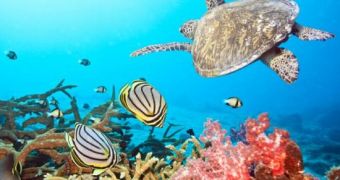By the end of this century, marine ecosystems will probably look nothing like they do these days. Scientists explain this is because ocean acidification is toying with the wellbeing of most marine species.
Although each marine species is affected differently by said phenomenon, the fact remains that aquatic wildlife as a whole is to be greatly disturbed in the years to come.
Writing in the journal Nature Climate Change, researchers at the Alfred Wegener Institute, Helmholtz Centre for Polar and Marine Research argue that, for the time being, some 25% of the CO2 released into the atmosphere by human activities gets sucked in by our planet's seas and oceans.
When absorbed by these water sources, the CO2 dissolves and forms a chemical compound known as carbonic acid.
The latter causes the water's pH to drop, meaning that it makes it more acidic that it normally would be.
Corals, crustaceans, mollusks, vertebrates and echinoderms are all to be affected by these changes in the seas' and oceans' chemistry, a meta-analysis of 167 previous studies on the matter at hand shows.
“Our study showed that all animal groups we considered are affected negatively by higher carbon dioxide concentrations,” specialist Astrid Wittmann says.
However, some are more resilient than others. “Corals, echinoderms and molluscs above all react very sensitively to a decline in the pH value,” Dr. Astrid Wittmann argues, as cited by EurekAlert.
Crustaceans and vertebrates, on the other hand, seem able to handle a drop in the pH of the aquatic environments they inhabit.
This assumption is backed up by evidence showing how, when atmospheric CO2 concentrations went haywire millions of years ago, fish and crustaceans extended their dominance.
“We compared our results with the widespread deaths of species around 250 and 55 million years ago when CO2 concentrations were also elevated.”
“Despite the relatively rough statements we were able to make with the assistance of sediment samples from the past, we discovered similar sensitivities in the same animal taxa,” Prof. Hans-Otto Pörtner explains.
However, given the fact that ocean acidification is accompanied by an increase in sea water temperatures, researchers fear that these species will also experience a decline in their population.
A report detailing the findings of this meta-analysis and its findings is to be made available to the public in March 2014.

 14 DAY TRIAL //
14 DAY TRIAL //